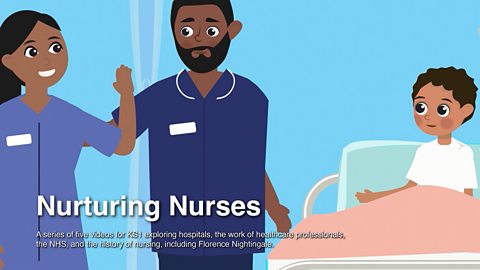Krish and Sammy find out about the history of nursing, including Florence Nightingale, Mary Seacole, Edith Cavell and Koforowola Abeni Pratt - the first black nurse to work for the NHS.
The video
Sammy: How's your leg feeling today, Krish?
Krish: It's not aching so much anymore.
Zane: My brother broke his ankle playing football too. He's back in the team now.
Nurse May: Hi everyone, snack time.
Krish: This place is great. All of the nurses are so nice to us.
Sammy: Maybe we could all be nurses when we grow up.
Nurse May: That's a great idea. Nursing has been a really important job for a very long time.
Zane: Can you tell us a bit about all the best nurses?
Nurse May: That would take far too long, but I can tell you about a few of them. Nurses like me didn't really exist until about 200 years ago.
Krish: How did people get looked after before that?
Nurse May: Most people were looked after by friends or family when they got ill. Villages and towns had doctors who would visit you in your house if you were really sick and there were midwives who helped women have babies. And religious people, such as monks and nuns who often cared for poorer people in need of help. But all that changed with a very famous nurse called Florence Nightingale.
Krish: She's got the same name as the ward we're in Nightingale Ward.
Nurse May: Yes, it's named after her. In the 1850s, Florence took a team of nurses to care for soldiers who were fighting in a war that was happening far away in a place called Crimea. The army hospital was dirty and crowded and the soldiers didn't have enough healthy food to eat or clean water to drink. So Florence improved the hospital by cleaning it and making sure the soldiers had healthier food and fresh water. When the war was over, Florence set up the first training school for nurses here in England.
Nurse May: Her work training nurses was so important that we choose to remember her to this day. That's why this ward is named after her. Another famous person who cared for soldiers in the Crimean War was Mary Seacole. Mary grew up in the Caribbean, where her mother taught her how to use plants to look after people. In the Crimea, Mary built a hotel that was so close to the fighting that it was used by many of the soldiers to get a hot meal and if they were injured, Mary would use her skills to look after them.
Nurse May: About 50 years later, Edith Cavell was a nurse who first worked in this country, before moving to Belgium, where she helped set up a training school. When a big war started in 1914, Belgium was taken over by soldiers from Germany. Edith cared for wounded soldiers from all sides and helped British and French soldiers escape to safety. Today, we remember Edith for her bravery and her determination to care for soldiers during a terrible time of war.
Nurse May: Kofoworola Abeni Pratt moved to the UK with her husband in 1946. She trained to become a nurse at the very same Florence Nightingale school I told you about, before going to work at a children's hospital in London. And that made Kofoworola the very first black nurse to work in a modern hospital in the UK. Later, she returned home to Nigeria, where she continued her work. We remember her because for so many nurses like me, she is someone to look up to.
Krish: Wow, some amazing nurses.
Nurse May: And there are many more nurses from history and nurses today who are just as hardworking and caring.
Sammy: Maybe you could tell us some more stories of famous nurses another day.
Nurse May: If you like.
Krish: We would.
3. The history of nursing
We see Krish and his fellow patients chatting on the children’s ward. They ask their nurse to tell them about some of the most famous nurses from history. The nurse explains that in times past most people were looked after by friends or family when they were ill. They learn about Florence Nightingale and Mary Seacole. They then hear about Edith Cavell who was a British nurse based in Belgium during the First World War, and Kofoworola Abeni Pratt, the first black nurse to work at a modern hospital in the UK.
Duration: 3' 33"
Final speech: 'If you like. / We would!'
Questions to ask
- Who looked after people in the days before nurses?
- Why is it a good thing that we have trained nurses now?
- What do nurses do when they are looking after someone?
- How is a nurse different to a doctor?
Before and after watching
- Recap what the children already know about Florence Nightingale and other nurses from history.
- Create a timeline, with the children putting the four nurses featured in the video into chronological order.
- Discuss what was the same and what was different about the four nurses (eg the first three travelled abroad to nurse soldiers in a time of war; but Abeni Pratt worked as a nurse in London in peacetime).
- Compare their clothing / uniforms and discuss what else might have been different for them compared to modern day hospitals.
- Write a short explanation about each of the four nurses - or choose just one to focus on - to describe why they are remembered today.
- Use images of the four nurses from the video to put into a timeline or as inspiration for writing.
